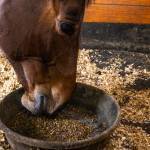Question
Foxy-Loxy, my 17-year-old Warmblood mare, has had frequent episodes of diarrhea over the past two years, despite a healthy appetite and moderate fleshy body condition. We’ve tried metronidazole, dexamethasone, probiotics, and prescription ulcer medication, and nothing works. The vet is stumped but thinks she could have inflammatory bowel disease (IBD). She’s fed free-choice grass hay, 2 lb (0.9 kg) of feed, and a digestive supplement. Do you have any thoughts?
Answer
No red flags pop up when evaluating Foxy-Loxy’s current diet, which makes me wonder if the diarrheal problem is at all related to her diet. Was there an environment or diet change two years ago that might have coincided with the onset of diarrhea?
Before adjusting the diet for IBD, be sure that all possible diagnostic tests have been completed, as these may yield important clues to the mare’s problem. A referral to a veterinary hospital might be necessary.
If she does have IBD, there are several things you could try. Increasing protein in the diet by offering a ration balancer pellet is one idea. Inflammatory bowel disease (IBD) can reduce the absorption of nutrients and enteric protein loss. Because she is only getting 2 lb (0.9 kg) of feed, it would be more advantageous to offer a balancer pellet that provides concentrated sources of protein, vitamins, and minerals. To provide the best opportunity for nutrient absorption, we recommend a product that offers natural-source vitamins and chelated minerals.
Sometimes switching to a pelleted diet helps with diarrhea, including using hay pellets as the forage source. The transition to pelleted hay should be done gradually. Offer many meals throughout the day instead of leaving a bucket of pellets or providing the total amount in two or three meals. Each feeding of pelleted forage should be no more than 2-4 lb (0.9-1.8 kg).
Consider balancing the hindgut environment with the supplement EquiShure. Many horse owners have reported success when using EquiShure in hard-to-beat diarrhea cases. This supplement is designed to be top-dressed on feed 2-3 times daily. EquiShure delivers active buffering agents to the hindgut to help regulate the pH. A healthy, consistent pH allows the microbial population to digest fiber properly.
In addition to EquiShure, feeding an omega-3 supplement high in docosahexaenoic acid (DHA) and eicosapentaenoic acid (EPA), like EO-3, may help with intestinal inflammation.








